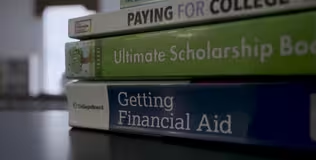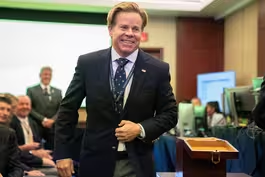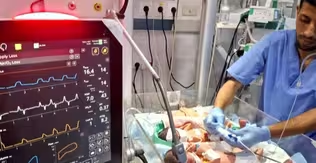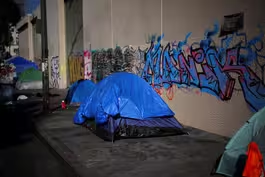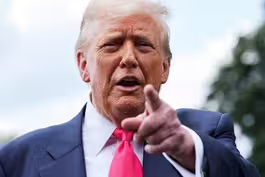
What Columbia's settlement means for higher education
Clip: 7/24/2025 | 8m 12sVideo has Closed Captions
What Columbia's settlement with the Trump administration means for higher education
Columbia University and the Trump administration reached a deal that restores federal funding and research grant money to the university. As part of the agreement, Columbia will pay $200 million to the federal government. Amna Nawaz discussed the agreement and what it means for higher education with Michael Roth, president of Wesleyan University.
Problems playing video? | Closed Captioning Feedback
Problems playing video? | Closed Captioning Feedback
Major corporate funding for the PBS News Hour is provided by BDO, BNSF, Consumer Cellular, American Cruise Lines, and Raymond James. Funding for the PBS NewsHour Weekend is provided by...

What Columbia's settlement means for higher education
Clip: 7/24/2025 | 8m 12sVideo has Closed Captions
Columbia University and the Trump administration reached a deal that restores federal funding and research grant money to the university. As part of the agreement, Columbia will pay $200 million to the federal government. Amna Nawaz discussed the agreement and what it means for higher education with Michael Roth, president of Wesleyan University.
Problems playing video? | Closed Captioning Feedback
How to Watch PBS News Hour
PBS News Hour is available to stream on pbs.org and the free PBS App, available on iPhone, Apple TV, Android TV, Android smartphones, Amazon Fire TV, Amazon Fire Tablet, Roku, Samsung Smart TV, and Vizio.
Providing Support for PBS.org
Learn Moreabout PBS online sponsorshipAMNA NAWAZ: Columbia University and the Trump administration have reached a deal that restores federal funding and research grant money to the university.
As part of the agreement, Columbia will pay $200 million to the federal government over three years and an additional $21 million to resolve alleged civil rights violations against Jewish employees.
The university agreed to suspend, expel, or revoke degrees from some 70 students who participated in pro-Palestinian demonstrations and it will issue a report to a monitor to ensure diversity, equity, and inclusion is not promoted on campus.
Columbia, which was at risk of losing billions of dollars from the government, says it retains its academic freedom.
For a closer look at this agreement and what it means for a higher education in the U.S., I'm joined by Michael Roth, president of Wesleyan University.
President Roth, welcome back to the "News Hour."
Thanks for joining us.
MICHAEL ROTH, President, Wesleyan University: Thanks for having me.
AMNA NAWAZ: So let's just start with your initial reaction.
When you heard the news and the details of this settlement, what did you think?
MICHAEL ROTH: Well, I felt like one must feel when you have paid a ransom in a kidnapping situation and the person who's been kidnapped is returned safely.
You think, thank goodness, the kid's OK, or the person kidnapped is OK.
But I wouldn't phrase the agreement that led to the liberation of the kidnapped person.
And so, in this case, I was pleased that this particular moment of assault on higher education by the Trump administration has been resolved, at least for now, although who knows.
These agreements come and go with this White House.
I was and I am distressed that, in this country today, the executive branch of the federal government wants to be able to dictate terms to private universities, law firms, newspapers, TV stations.
And so all of these things are evidence that the current administration is trying to erode support for institutions in civil society.
AMNA NAWAZ: Let me put to you, if I may, what the acting president of Columbia University, Claire Shipman, said in an interview on CNN this morning defending the terms of the deal.
CLAIRE SHIPMAN, Acting President, Columbia University: I think there are a couple of really important things about this agreement from our point of view.
One, it doesn't cross the red lines that we laid out.
It protects our academic integrity.
That was, of course, essential to us.
And, two, it does reset our relationship with the federal government in terms of research funding.
And it's not just money for Columbia.
I mean, this is about science.
It's about curing cancer, cutting-edge, boundary-breaking science that actually benefits the country and humanity.
AMNA NAWAZ: President Roth, do you believe that, after this deal, Columbia can move forward with full academic freedom, as President Shipman there is saying?
And what do you believe the downstream effects of making a deal like this are for other universities?
MICHAEL ROTH: Well, it's very clear that if you annoy the White House in this regime, you could get sucked into a process of litigation or fines that bear no relation to the facts of the matter, but just become a way of expressing loyalty, of conforming to the wishes of the government.
We saw it at UVA just a week or two ago.
You see it now at George Mason.
This is an effort to tell universities, as they have told law firms, as they're telling newspapers and as they have done with TV stations, telling these organizations, you are not independent.
If you contract with the federal government, we have a -- we, the government, has the right to tell you what to do.
This agreement does protect many things at Columbia.
And, again, I'm not criticizing them for signing it.
I don't criticize the parent for paying a ransom to get their kids back.
They're getting their science back.
But they're also telling the federal government, you can tell us how to run our Middle East studies program, telling the federal government, you can tell us how many police officers we should have at a minimum on campus or how students should be disciplined.
The White House has determined how students should be disciplined at a private university.
This is massive overreach.
This is an assault on the independence of civil society in America.
And conservatives, liberals, moderates, they should all be concerned when a White House tells you how to run your private associations.
AMNA NAWAZ: So you're saying they should be concerned.
As you note, Columbia is not the only university that's been targeted by this administration.
Harvard, as we have been covering, has actually been fighting the administration in court, but we know there's also settlement talks going on.
Do you believe universities and colleges will have no other choice but to make some kind of deal in order to move forward?
MICHAEL ROTH: Well, I do think that, when you're dealing with a very, very powerful entity like the federal government, especially when it doesn't obey its own laws - - I mean, there are no findings of fact here about what the specific actions of antisemitism were -- or discrimination against white people.
There's no findings of facts there.
It's just, you give us $221 million, and then we allow you to compete for grants.
I mean, it's a very old-fashioned game.
You pay the powerful figure so that you can go along and continue to operate.
Now, you operate in a way, of course, that you don't want to annoy that powerful figure or that powerful organization.
And it sends a chilling message across America that, if you have a late-night comedy show, if you have a law firm, if you are working in an educational institution or a library, or, as we read today, in a museum like the Smithsonian, if you don't please the president, you are at risk.
And, again, I don't blame them for trying to make the best of that situation, but, as Americans, I'm not worried about Columbia.
I'm not worried about Wesleyan.
I'm worried about the country, where we are being subject to a White House that thinks it could tell us what to do at every turn.
AMNA NAWAZ: As you know, the administration has long argued that this was about combating antisemitism on campus.
This was a deal welcomed by Columbia's Hillel Jewish organization.
The executive director said in part: "The announcement's an important recognition of what Jewish students and families have expressed with increasing urgency.
Antisemitism at Columbia is real.
It has a tangible impact on Jewish students' sense of safety, belonging, and their civil rights."
I guess the question, President Roth, is if it makes Jewish students and staff feel safer, did the administration pressure and the deal do what it intended to do?
MICHAEL ROTH: How does paying the government $220 million to do basic science make Jews safer?
As a Jew, I find this horrific.
I know antisemitism is real, and I know it was real and is real at Columbia, as it is in Congress, as it is in most places in the United States.
But the idea that you pay off the government in order to get them off your back so you can do cancer research, and that's good for the Jews, I think it's ridiculous.
We don't need the White House to tell us antisemitism is real two weeks after the Defense Department contracts with Grok, Elon Musk's artificial intelligence entity after it praised Hitler.
This is an administration that is not concerned with Jewish welfare.
I am concerned with Jewish welfare as a Jew, as a professor, as a college president.
I think it's really important to call out antisemitism.
But to pay up basically protection money in a way that's supposed to make Jews safer, I think, in the long run, it's -- as we say in my community, it's not good for the Jews.
AMNA NAWAZ: That is Michael Roth, president of Wesleyan University, joining us tonight.
President Roth, thank you for your time.
MICHAEL ROTH: Thank you for having me.
Crackdown on unpaid student loans could impact millions
Video has Closed Captions
Clip: 7/24/2025 | 8m 21s | How the government's crackdown on unpaid student loans could impact millions (8m 21s)
GOP Rep. Haridopolos recaps Trump's first 6 months
Video has Closed Captions
Clip: 7/24/2025 | 8m 23s | 'We kept our promises': Rep. Haridopolos touts GOP victories in Trump's first 6 months (8m 23s)
Inside Gaza’s neonatal wards where babies battle the odds
Video has Closed Captions
Clip: 7/24/2025 | 8m | Inside Gaza’s neonatal wards where babies born into a war zone battle the odds (8m)
News Wrap: Trump urges cities to clear homeless from streets
Video has Closed Captions
Clip: 7/24/2025 | 6m | News Wrap: Trump pushes cities to remove homeless people from streets (6m)
Trump ramps up pressure on Powell in Fed visit
Video has Closed Captions
Clip: 7/24/2025 | 8m 35s | Trump ramps up pressure on Powell to cut interest rates during visit to Federal Reserve (8m 35s)
Why the DOJ met with Epstein accomplice Ghislaine Maxwell
Video has Closed Captions
Clip: 7/24/2025 | 4m 41s | Why the DOJ met with Ghislaine Maxwell amid backlash over Trump's Epstein ties (4m 41s)
Providing Support for PBS.org
Learn Moreabout PBS online sponsorshipSupport for PBS provided by:
Major corporate funding for the PBS News Hour is provided by BDO, BNSF, Consumer Cellular, American Cruise Lines, and Raymond James. Funding for the PBS NewsHour Weekend is provided by...
